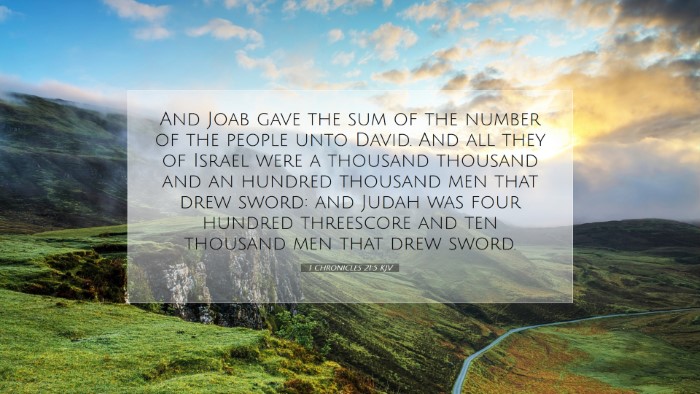Commentary on 1 Chronicles 21:5
Verse: "And Joab gave the sum of the number of the people unto David. And all they of Israel were a thousand thousand and an hundred thousand men that drew sword: and Judah was four hundred threescore and ten thousand men that drew sword."
Introduction
This verse provides a crucial insight into the historical context of Israel during the reign of King David, particularly regarding the military organization of the tribes and the implications of David's decision to carry out a census. The significance of this enumeration is profound, as it raises theological and moral questions that resonate throughout the Scripture.
Summary of Insights from Public Domain Commentaries
Matthew Henry's Commentary
Matthew Henry emphasizes the gravity of the census taken by Joab on David's command. He highlights that this act, while seemingly administrative, indicates a lack of faith in God’s ability to sustain and protect Israel. Henry states:
"David's numbering of the people was a sin against God because it suggested reliance on military strength rather than divine sovereignty."
Henry also points out that Joab’s reluctance to count the tribes stems from his understanding of the potential consequences of such an act, suggesting a moral awareness that David seemed to overlook.
Albert Barnes' Notes on the Bible
Albert Barnes provides a detailed analysis of the numbers stated in this verse. He notes the overwhelming size of the Israelite army as being around 1.1 million, while Judah had approximately 470,000. Barnes contextualizes this information by saying:
"The sheer number of soldiers reflects the population and resources of Israelite society during David's reign, but heightens concern over the king's heart posture in orchestrating such a count."
Barnes concludes that while this might have showcased Israel's military might, it ultimately exemplified a pervasive trust in human strength, diverging from the covenantal faithfulness expected of Israel's leadership.
Adam Clarke's Commentary
Adam Clarke offers insights related to the implications of the census, underscoring that it carried with it a significant spiritual risk. He asserts that the numbers, while impressive, could lead to a misplaced sense of security for David and the people:
"The reliance on numbers for assurance can lead to spiritual danger, where blessings are calculated by human metrics rather than divine providence."
Clarke also references historical reflections on census-taking in the biblical narrative and warns against the potential pride and arrogance that can arise when individuals or nations rely upon their own might.
Theological Implications
From these commentaries, several theological motifs emerge that deepen our understanding of the verse:
- The Nature of Sin: David's numbering is framed as an act of faithlessness. It invites reflection on how reliance on tangible metrics often displaces dependence on God.
- Divine Sovereignty vs. Human Effort: The count reveals a tension inherent in the human condition: the temptation to weigh security in terms of human capabilities rather than divine promise.
- Judgment and Consequences: The act of counting people leads to dire consequences later in the narrative, indicating a moral law at work that values obedience to God's commands over empirical data.
Application for Pastors and Theologians
For pastors and theologians today, several applications can be drawn from this verse:
- Faithfulness in Leadership: An examination of personal and corporate leadership is essential. How often do leaders rely on metrics over the quiet assurance of God's provision?
- The Value of Prayer: Before decisions are made that impact the community, a posture of prayer seeks God’s will rather than relying solely on available statistics.
- Awareness of Sin: This passage serves as a reminder to be mindful of how sin can manifest even in seemingly benign actions, compelling leaders to turn consistently to God for guidance.
Conclusion
1 Chronicles 21:5 provides a compact but profound narrative about the heart of leadership and the inherent dangers of placing confidence in human might. Whether through the eyes of Henry, Barnes, or Clarke, we are reminded of the broader theological themes at play—the need for a continual reliance on God’s promises, and the dangers of counting that can lead to complacency and sin.


